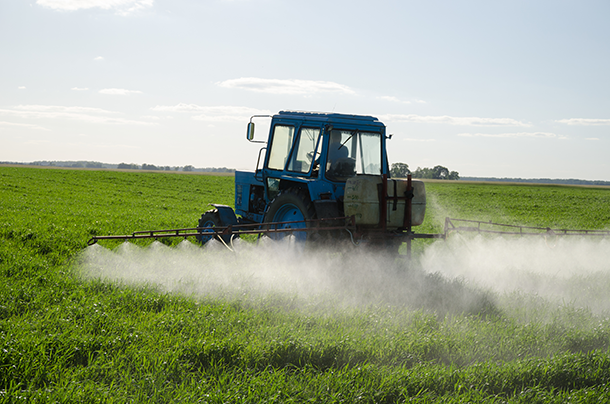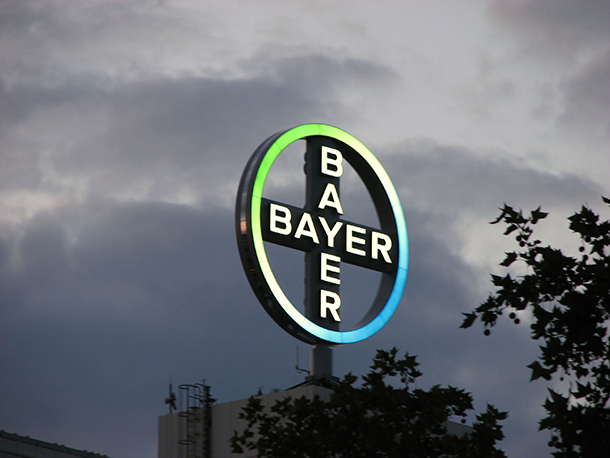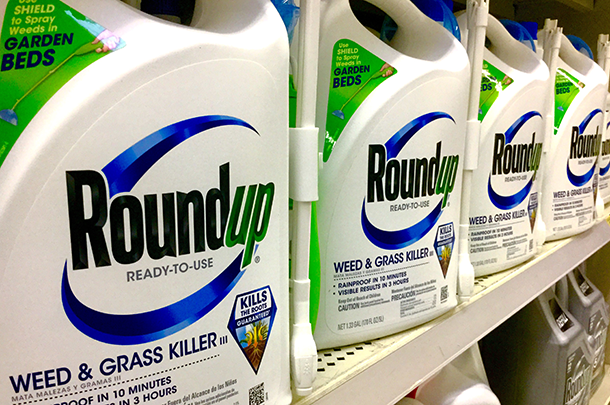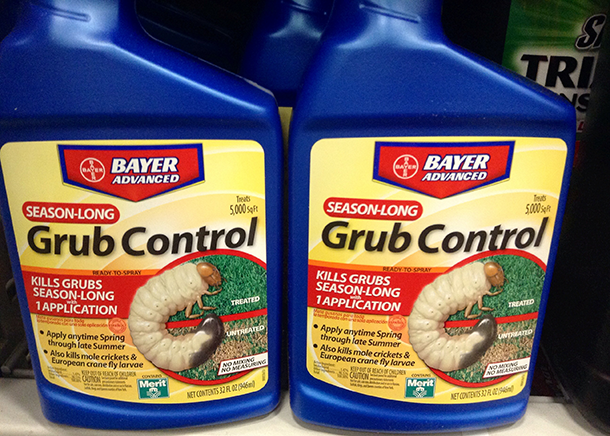Billion Dollar Losses Related to Roundup
Air Date: Week of September 28, 2018

A tractor sprays farm chemicals on a field. (Photo: Aqua Mechanical, Flickr CC BY 2.0)
Pharmaceutical and chemical giant Bayer has shed some $20 Billion in market value in the weeks after a California court ordered it to pay $289 million in damages to plaintiff Dewayne Lee Johnson related to the herbicide Roundup made by Bayer-owned Monsanto. Jurors found that Monsanto had acted with malice and negligence in failing to warn Johnson, who is now suffering from late-stage non-Hodgkins lymphoma, about the cancer risks associated with Roundup and its key ingredient glyphosate. Journalist Carey Gillam tells Host Steve Curwood that with thousands of similar cases in the pipeline, Bayer may be on the hook for billions more, even though it merged with Monsanto just three months ago.
Transcript
CURWOOD: From PRI and the Jennifer and Ted Stanley Studios at the University of Massachusetts Boston this is Living on Earth. I’m Steve Curwood.
A finding of consumer deception against Monsanto, makers of the widely used herbicide Roundup, is costing its new parent company more than $20 billion in lost market value as its stock price has tanked. In June the German pharmaceutical and chemical giant Bayer merged with Monsanto by paying over $60 billion, just 2 months before a California jury ruled unanimously in favor of Dewayne Lee Johnson. Mr. Johnson is a former school groundskeeper, and the jury agreed his non-Hodgkins lymphoma was caused by the herbicide Roundup and ordered Monsanto to pay $289 million in damages. Now Bayer has to pay those damages and the company is likely to have to pay thousands of other people who claim Roundup caused their cancers or other health problems as well. Carey Gillam, a journalist who has reported extensively on Monsanto, joins us now. Carey, welcome back to Living on Earth!
GILLAM: Thanks for having me.
CURWOOD: So, tell me why have Bayer's shares reacted so dramatically dropping what some 20 percent in just a matter of weeks?
GILLAM: Yeah, I mean Bayer shares are definitely taking a hit, and really what this is is it's the fault of the Bayer executives who did not properly warn their shareholders that this potential liability was out there. Investors were stunned by this very large verdict - $289 million - it was a unanimous decision by the jury and of course we have thousands of more lawsuits making very similar claims that will be be relied on similar evidence. I mean, potentially we're talking about billions of dollars in potential payouts and damages. At some point if these things continue to snowball and the plaintiffs continue to win, there will be settlement talks, and the numbers that I've already heard tossed around are $3 to $5 billion dollars potentially.

Bayer’s share price fell 20% in the weeks following the Dewayne Johnson v. Monsanto Company verdict. (Photo: Conan, Flickr CC BY 2.0)
CURWOOD: Of course, those are not just damages that Bayer has to worry about, but how are consumers considering this company now?
GILLAM: I mean, what you what you're seeing is sort of a continuation a building of concern around the world. You already were seeing different localities, and states and countries looking at banning glyphosate products and you now seen even more of that. Every bit of news on this causes heightened concern obviously with consumers. You're seeing some retailers talk about pulling these from their store shelves. This is resonating definitely around the world.
CURWOOD: Now, what you think the chances are that the $289 million dollars awarded to the plaintiff Dewayne Johnson could be overturned or reduced?
GILLAM: So, the legal experts that I've consulted and that are talking about this really say there's very little chance. It doesn't seem like there's a lot of legal standing for Monsanto to get this thrown out like they've asked the judge to do. They've asked for a new trial and they've also asked the judge to issue a judgment on standing to substantially reduce the damage award. But the judge was very favorable and very generous to Monsanto during the trial already and kept a lot of evidence that Monsanto didn't want in, kept a lot of that evidence out, there doesn't seem to be a lot of room for Monsanto to get this thrown out at this point.

As a groundskeeper for four years in the Benicia, CA school district, plaintiff Dewayne Lee Johnson applied the herbicide Roundup to school grounds about 20 to 30 times a year. (Photo: Mike Mozart, Flickr CC BY 2.0)
CURWOOD: So, Carey what was the evidence that the plaintiffs wanted in this case that the judge said no, no, no...I'm going to honor what Monsanto wants...we won't let this in.
GILLAM: One of the key things I guess that Monsanto really did not want in there was any sort of direct comparison to the tobacco industry. As we know from litigation in the tobacco industry, we know there was very much a playbook, a strategy to deceive consumers and keep them from understanding the risks of tobacco and its connections to lung cancer. And the very same playbook, there's evidence that very same playbook has been used by Monsanto to keep consumers from understanding the risks of glyphosate herbicides. You see the same players, in fact, Monsanto's own attorney in this roundup litigation made his fame and fortune defending tobacco companies. They didn't want any of those comparisons and the judge largely sided with Monsanto on that. They didn't want people to know about a ban in Europe on one of the key ingredients in the Roundup products. The judge sided with them on that. They didn't want people to know that California had ordered companies to start putting warning labels on Roundup and other glyphosate products. The judge sided with them on that. A lot of information like that was kept from the jury and still they came up with this huge verdict against Monsanto.
CURWOOD: To what extent does this verdict say that Monsanto deceived consumers knowing that it had a problem product they put on the market?
GILLAM: The jury found not only that there was enough scientific evidence to connect these products to this individual's cancer, but that Monsanto acted with malice and negligence in refusing to warn people because, of course, there are years and years and years of scientific studies that have come out from independent scientists that do show connections between glyphosate based products and cancers and a range of other illnesses. And Monsanto and has long been aware of these. And the jury was saying they should have warned people, they should have at least given people this information. This wasn't about banning glyphosate. It was about warning consumers about known risks and, of course, Monsanto didn't do any of that. They did the opposite. They tried to suppress that information, tried to hide it and tried to discredit scientists who raised those warning bells.

A single Roundup-Ready corn plant appears to be thriving in a demonstration field that has been heavily sprayed with the glyphosate-based Roundup herbicide. But pesticide-resistant weeds are starting to diminish glyphosate’s effectiveness. (Photo: Matthew Traucht, Flickr CC BY-NC-ND 2.0)
CURWOOD: You mention negligence, but you also said malice. To what extent did the judge and jury find that Monsanto had acted with malice in distributing and encouraging the use of Roundup?
GILLAM: Well, that was part of the questionnaire. That was part of what the jury had to determine. They really seemed to be moved by the fact that this individual Lee Johnson called Monsanto. He was very worried he'd been diagnosed with cancer. He was worried about whether or not he should continue his job, should continue working to spray these products and Monsanto never warned him even after these international cancer scientists said there was a connection. They never got back to him and they never warned him. The jury really seemed to take issue with that.
CURWOOD: Now, Bayer CEO Werner Baumann is facing questions as to whether he and the other executives really did a full scale assessment probably evaluated the risks of taking over Monsanto. How much trouble could he be in?
GILLAM: Well, there's definitely talk of shareholder lawsuits against Bayer and against the executives for not really doing their due diligence and for not warning investors properly. It doesn't seem like they really were on top of this at all. I mean, anybody who's been paying even a little bit of attention knew that there was this potential for huge jury award certainly he in his conference call with investors right after the verdict, he didn't even have the proper classification from the Center National Cancer Agency. He said it was rated a possible carcinogen. Well, that's not true. It was rated a probable carcinogen. He didn't have a clear grasp of the facts as he was trying to reassure investors, and that tells us he didn't have a clear grasp of the facts going into this at all.
CURWOOD: Carey, you're saying that the Bayer executives didn't understand the science here?
GILLAM: I don't think that they were paying a lot of attention. They were relying on the assurances by Monsanto that this was really nothing to worry about, and the Bayer executives did say in this call with investors right after the verdict, they did admit and they said they didn't have a lot of visibility to Monsanto's internal documents. They only closed this deal with Monsanto in June and just really got the integration closed in August, so they're claiming they didn't have good insight at the time.

Bayer already had a strong presence in the pesticides market before purchasing Monsanto in 2018. (Photo: Mike Mozart, Flickr CC BY 2.0)
CURWOOD: So, what options if any does Bayer have to say, hey Monsanto, you really didn't disclose properly to us, we want to walk this deal back, we want to unwind this merger?
GILLAM: Well, they're certainly not talking about that at all right now, and they're showing no signs of backing away. In fact, they are saying they're going to double down and bring all of their legal strength to Bayer to try to fight this verdict and to fight the trials that are upcoming. We have several new ones, they are being scheduled for 2019, so this could go on for some time and it's certainly going to cost a lot of money at least in in legal fees, for sure, and if not legal payouts.
CURWOOD: And speaking of legal fees, with this win, how soon does the plaintiff of Mr. Johnson and his attorneys get paid?
GILLAM: Well, that's that's a good question. Monsanto is appealing. The money actually gets put into an account right now with interest, and it's accruing interest on a daily basis. Mr. Johnson, my understanding is he's getting a little bit of money right now through sort of a loan against what his payout would be, but it could be a year or more before before it's really all settled. The interesting thing on this is that Mr. Johnson's attorneys had actually offered a settlement of $6 million dollars to Monsanto in April and Monsanto turned it down.
CURWOOD: Carey go amiss a journalist and author of "Whitewash: The Story of a Weed Killer, Cancer, and the Corruption of Science". Carey Gillam thanks so much for taking the time with us today.
GILLAM: Thanks for having me.
CURWOOD: We asked Bayer for a comment. They replied in part, “Bayer stands behind its glyphosate-based products and we are confident that the company will ultimately prevail in this litigation based on the extensive body of favorable science.”
You can find their entire statement on our website, LOE dot org.
Statement from Bayer
“Glyphosate-based herbicides have been used safely and successfully for over four decades worldwide and are a valuable tool to help farmers deliver crops to markets and practice sustainable farming by reducing soil tillage, soil erosion and carbon emissions. The full body of research on glyphosate and Monsanto’s glyphosate-based herbicides consists of more than 800 rigorous registration studies required by EPA, European and other regulators that found them to be safe for use. This extensive science also encompasses more than 100 studies examining the carcinogenic potential of these same substances that EPA considered relevant to its 2017 cancer risk assessment which concluded glyphosate is ‘not likely to be carcinogenic to humans,’ the agency’s most favorable rating. Notably, the largest and most recent epidemiologic study, the 2018 independent National Cancer Institute long-term study that followed over 50,000 pesticide applicators, found no association between glyphosate-based herbicides and cancer.
“The Johnson verdict is wholly at odds with over 40 years of real-world use, an extensive body of scientific data and analysis, including in-depth reviews by regulatory authorities in the U.S. and EU, and approvals in 160 countries, which support the conclusion that glyphosate-based herbicides are safe for use and do not cause cancer in humans. As the admissions by plaintiff’s experts at trial made clear, the epidemiological evidence presented fell well below the causation standard required under California law.”
“The number of cases in this litigation may rise and fall over time, but these numbers are not indicative of the merits of the claims.
“Bayer stands behind its glyphosate-based products and we are confident that the company will ultimately prevail in this litigation based on the extensive body of favorable science.”
Links
Wall Street Journal | “Bayer Steps Up Legal Fight Over Weed Killer Blamed for Cancer”
CBS News | “Man dying of cancer says $289 million Monsanto verdict not ‘in vain’”
LOE’s coverage of anti-trust concerns over recent ag company mergers
Living on Earth wants to hear from you!
Living on Earth
62 Calef Highway, Suite 212
Lee, NH 03861
Telephone: 617-287-4121
E-mail: comments@loe.org
Newsletter [Click here]
Donate to Living on Earth!
Living on Earth is an independent media program and relies entirely on contributions from listeners and institutions supporting public service. Please donate now to preserve an independent environmental voice.
NewsletterLiving on Earth offers a weekly delivery of the show's rundown to your mailbox. Sign up for our newsletter today!
 Sailors For The Sea: Be the change you want to sea.
Sailors For The Sea: Be the change you want to sea.
 The Grantham Foundation for the Protection of the Environment: Committed to protecting and improving the health of the global environment.
The Grantham Foundation for the Protection of the Environment: Committed to protecting and improving the health of the global environment.
 Contribute to Living on Earth and receive, as our gift to you, an archival print of one of Mark Seth Lender's extraordinary wildlife photographs. Follow the link to see Mark's current collection of photographs.
Contribute to Living on Earth and receive, as our gift to you, an archival print of one of Mark Seth Lender's extraordinary wildlife photographs. Follow the link to see Mark's current collection of photographs.
 Buy a signed copy of Mark Seth Lender's book Smeagull the Seagull & support Living on Earth
Buy a signed copy of Mark Seth Lender's book Smeagull the Seagull & support Living on Earth

